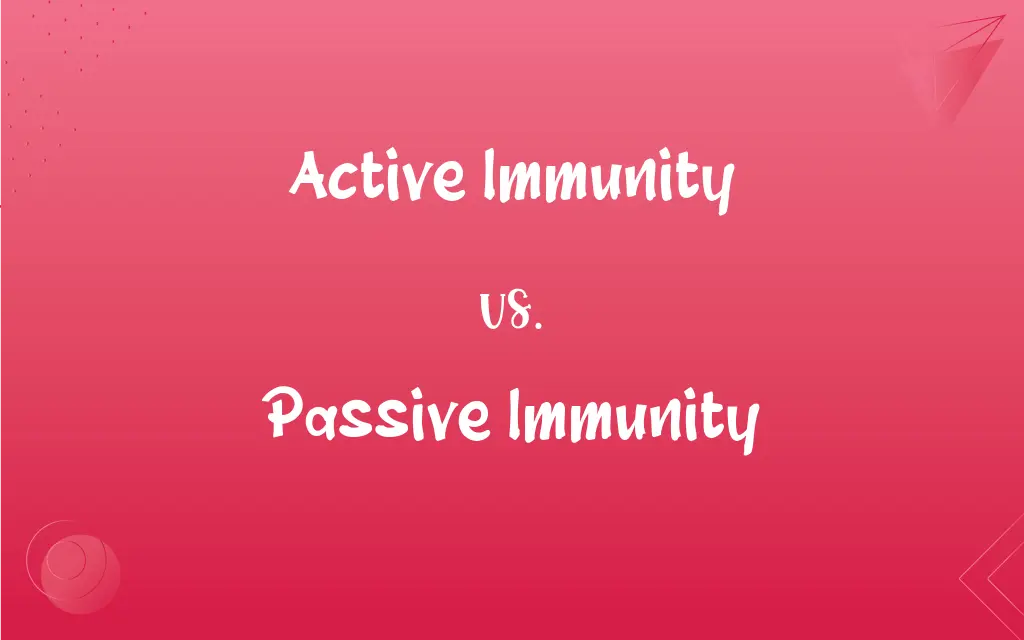Active Immunity vs. Passive Immunity: What's the Difference?
Edited by Janet White || By Harlon Moss || Updated on October 17, 2023
Active immunity results from exposure to the disease pathogen; passive immunity is acquired through antibodies from another source.

Key Differences
Active immunity arises when the body's immune system responds to a foreign agent, while passive immunity is provided by introducing external antibodies.
Active immunity is generally long-lasting due to memory cell formation, whereas passive immunity offers temporary protection as it lacks memory cells.
Active immunity can result from either natural exposure to a pathogen or vaccination, while passive immunity can be achieved by receiving pre-made antibodies, like in maternal antibody transfer.
For active immunity to develop, the immune system must recognize, respond to, and remember the antigen. In passive immunity, there's no direct antigen exposure or memory cell formation.
Active immunity requires a period for its development after exposure, while passive immunity grants immediate protection since antibodies are directly provided.
ADVERTISEMENT
Comparison Chart
Source of Immunity
Body's own immune response
External source of antibodies
Duration
Generally long-lasting
Temporary
Development Time
Takes time after exposure
Immediate protection
Memory Cell Formation
Yes
No
Examples
Vaccination or natural infection
Maternal antibody transfer, antibody injections
ADVERTISEMENT
Active Immunity and Passive Immunity Definitions
Active Immunity
Resistance developed from exposure to a disease or vaccination.
Her active immunity to measles resulted from her childhood vaccination.
Passive Immunity
Temporary protection as it lacks immune memory.
The passive immunity from the maternal antibodies will wear off after a few months.
Active Immunity
Protection arising from the body's own defense mechanisms.
Through active immunity, our body remembers pathogens for future defense.
Passive Immunity
Immunity sourced from another individual or animal.
The snakebite victim was given passive immunity through antivenom.
Active Immunity
Immune response that results in the production of specific antibodies or cells.
The vaccine works by stimulating active immunity against the flu virus.
Passive Immunity
Protection granted by introducing external antibodies.
Newborns receive passive immunity from their mother's breast milk.
Active Immunity
A self-generated immune response to pathogens.
After recovering from chickenpox, he developed active immunity to the virus.
Passive Immunity
Direct provision of antibodies, without direct antigen exposure.
Passive immunity can be a lifesaver when immediate protection is needed.
Active Immunity
Body's way of providing long-term protection after encountering an antigen.
Active immunity can keep certain diseases at bay for years or even a lifetime.
Passive Immunity
Immunity acquired without the body generating a response.
He received passive immunity through an antibody serum injection.
FAQs
Why is passive immunity immediate?
Passive immunity grants immediate protection as antibodies are directly provided.
What is active immunity?
Active immunity is a self-generated immune response to pathogens or vaccines.
How do newborns benefit from passive immunity?
Newborns receive passive immunity from their mothers, protecting them from certain infections early in life.
Can active immunity be transferred from one person to another?
No, active immunity can't be transferred, but passive immunity can through antibodies.
Is active immunity always better than passive immunity?
Not always. Active immunity provides long-term protection, but passive immunity is vital for immediate protection.
Are there risks associated with passive immunity?
Yes, some people might have allergic reactions or other side effects to antibody treatments.
Does active immunity last longer than passive immunity?
Yes, active immunity is generally long-lasting while passive immunity offers temporary protection.
Can both active immunity and passive immunity coexist in an individual?
Yes, an individual can have both active and passive immunity for different diseases.
Why is passive immunity considered temporary?
Because the externally provided antibodies degrade over time without the body's own sustained response.
Is passive immunity natural or artificial?
It can be both; for instance, maternal transfer is natural, while antibody injections are artificial.
Can active immunity be achieved without vaccines?
Yes, by naturally contracting and recovering from certain diseases.
How does the body maintain active immunity?
Through memory cells that recognize and quickly respond to repeat exposures.
How is passive immunity acquired?
Passive immunity is acquired by introducing external antibodies, like through maternal transfer or injections.
How does a vaccine contribute to active immunity?
Vaccines stimulate the body to produce its own antibodies, leading to active immunity.
Why doesn't passive immunity have a memory component?
Passive immunity lacks memory because it introduces ready-made antibodies without triggering the body's own immune response.
What's an example of active immunity in daily life?
Recovering from diseases like chickenpox results in active immunity against future infections.
What's a common example of passive immunity?
Receiving antivenom after a snakebite introduces passive immunity against the venom.
Why might a doctor recommend passive immunity in some cases?
Passive immunity can offer immediate protection when there's no time for the body to develop its own response.
Does active immunity require direct exposure to the disease?
Not necessarily. Vaccinations can induce active immunity without causing the disease.
Do all vaccines provide active immunity?
Most vaccines aim to provide active immunity, though some might offer passive components.
About Author
Written by
Harlon MossHarlon is a seasoned quality moderator and accomplished content writer for Difference Wiki. An alumnus of the prestigious University of California, he earned his degree in Computer Science. Leveraging his academic background, Harlon brings a meticulous and informed perspective to his work, ensuring content accuracy and excellence.
Edited by
Janet WhiteJanet White has been an esteemed writer and blogger for Difference Wiki. Holding a Master's degree in Science and Medical Journalism from the prestigious Boston University, she has consistently demonstrated her expertise and passion for her field. When she's not immersed in her work, Janet relishes her time exercising, delving into a good book, and cherishing moments with friends and family.






























































